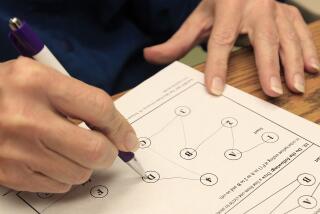Test-Takers Cite Disabilities
- Share via
Re “New Test-Taking Skill: Working the System,” Jan. 9: In this age of the “abuse excuse,” it’s no surprise that anxious parents are gaming the standardized test system by using psychiatrists and psychologists to help get their high schoolers more time to take the SAT by providing diagnoses like learning disability or attention deficit hyperactivity disorder. (That nonpsychiatric physicians are said to write such excuses is particularly galling, given that it is outside their domain of professional expertise to make these diagnoses.)
One of the negative consequences of this questionable practice is that it raises doubts about the legitimacy of handicaps that a small minority of young people have. But why stop at ADHD and dyslexia? How about test anxiety? How about feeling down or a bad hair day?
GERALD C. DAVISON PhD
Professor of Psychology
USC
*
There is another factor contributing to the SAT scam that you’ve overlooked: a sense among students at elite schools that they are entitled to high marks.
I am a graduate student teaching assistant at UCLA, and every quarter I fight the same battle with undergraduates over their grades: “I’m not a B (or C) student!” They bring an attitude of entitlement to top grades--despite the fact that their work is often appallingly poor. Undergraduates at UCLA often cannot write simple essays, express ideas or read critically.
High schools do their students a disservice by inflating grades. Parents do their children a disservice by trying to milk “every advantage” out of the system. Students are then shocked by what they consider to be “hard” grading that is, in reality, simply fair grading. It is for many a rude awakening to a world that does not exist to cater to their whims.
RUSSELL BURGOS
Thousand Oaks
*
Your Jan. 11 editorial on SAT abuse by the “elite” makes the point that most of the accommodations result in making extra time available. The solution appears simple--keep the test the same but give all students the 4.5 hours. Those who wish to leave early may do so. What reasonable basis would there be for anyone complain?
GIL EDELMAN
Newport Beach
*
Your article does a terrible disservice to the tens of thousands of students with learning disabilities who struggle with unresponsive bureaucracies and misinformation and stereotyping. The article wholly ignores the multiple studies that show that learning disabilities are underdiagnosed, and that girls in particular often have their learning disabilities undetected. There is no study which even remotely supports your anecdotal conclusion that accommodations are being improperly granted on a widespread basis.
The article also utterly ignores the pervasive societal stigmatization of these disabilities, which prevents thousands of students from even asking for the accommodations that would allow them to show their true abilities.
LAURENCE W. PARADIS
Executive Director, Disability
Rights Advocates, Oakland
*
How would you like to go into the emergency room of a hospital and find that the doctor could not read the Physician’s Desk Reference entry regarding a severe drug interaction unless “extra time” was provided? Or pay a lawyer $300 per hour who had been given “extra time” to take the LSAT and then extra time to take the bar exam?
I have just finished 38 years of teaching organic chemistry at Mount Holyoke College. For the first 20 years no student asked for extra time on exams. Then the college hired a “dean of learning disabilities.” Suddenly students were found “learning disabled” and needed extra time on exams.
I have argued that all students in my course are in a sense “learning disabled.” If they were not they would buy the textbook, read and comprehend the contents, take the final exam and pass the course. A genius, like the late R.B. Woodward, Nobel Prize winner, could (and did) do this. The rest need to have things explained by a professor.
I recently spent two years teaching organic chemistry at MIT. Not one of the 500 students I taught asked for extra time on exams. Somehow I doubt if many of them got to the sophomore year at that institution by taking advantage of the Educational Testing Service; I’m sure the same is true at Caltech.
KENNETH L. WILLIAMSON
Visiting Professor of Chemistry
Caltech, Pasadena
More to Read
Sign up for Essential California
The most important California stories and recommendations in your inbox every morning.
You may occasionally receive promotional content from the Los Angeles Times.












